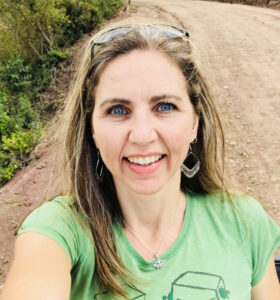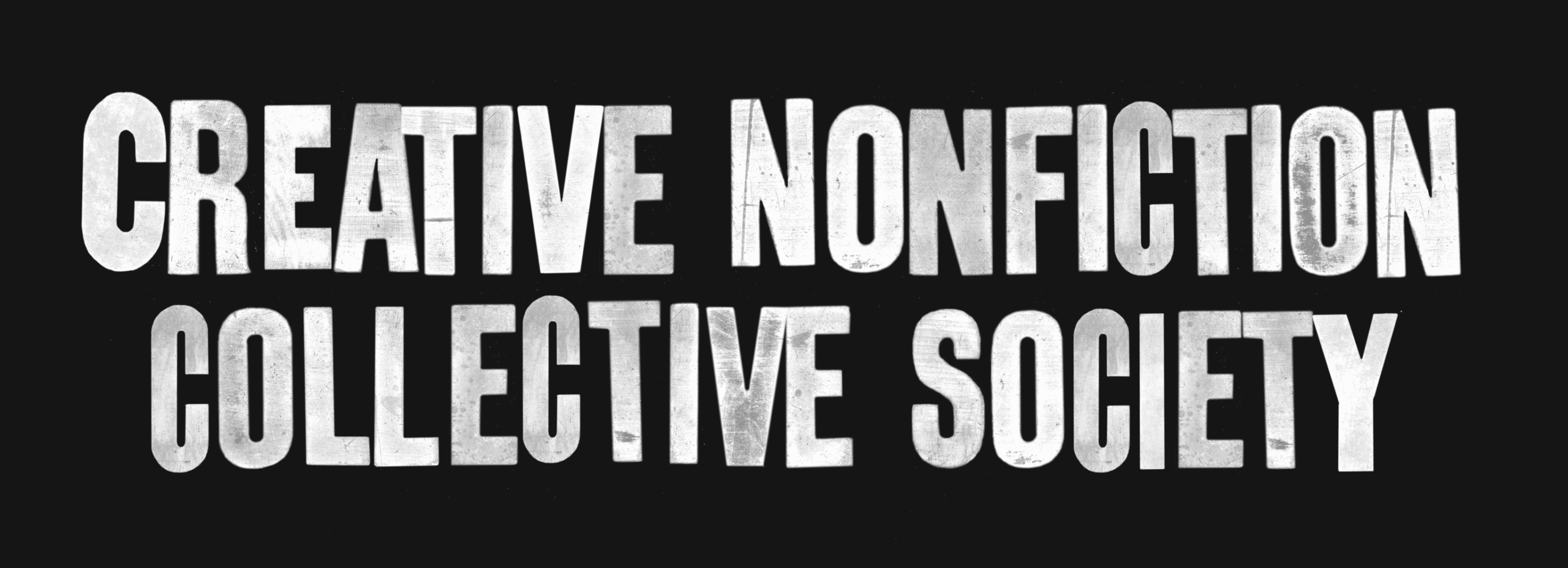Fiona Campbell (she/her) is a CNF writer, journalist, editor and communications professional. She’s also a passionate storyteller who never outgrew her love of the question, “Why?” For 20 years she’s written for national magazines, websites and non-profits on topics related to the arts, sustainable agriculture, the environment, travel, running and social justice.
She has an MFA in creative nonfiction (University of King’s College), a BAA in journalism with a specialty in magazine writing and publishing (Ryerson University), and a BA in international development (University of Guelph). Fiona is working on a collection of lyrical essays from her home in Madoc, Ont., (treaty territory of the Anishinabewaki people) where she currently lives with her two teenage kids (ages 19 & 17), one dog, and too many books, though she hopes to move the East coast very soon. When she’s not working, she likes to run, a lot, and really far. Find her at fionacampbell.ca and findingfiona.ca (though both need updating; don’t judge.)
Recently CNCF’s Lesley Buxton had the pleasure of interviewing Fiona. We hope members will enjoy learning about this talented writer.

Why did you decide to join the board?
It sounds a bit cliched but I joined the board as a way to give back to the CNF community, and also to be a part of a national organization that supports and elevates the voices of CNF writers, while providing relevant professional development opportunities. It’s also a way for me to build connections with likeminded people and learn more about the issues facing CNF writers in Canada. It’s easy to become insular in one’s thinking, so I find it stimulating to become part of something bigger than me, if that makes sense. My experiences with CNFC have always been ones of generosity and support, and I wanted to be a part of creating that for others. I also have some skill in graphic design and social media, and enjoy helping out with that.
Why do you think community is so important for writers?
The notion of community is a curious one for writers. I think most of us spend much of our time alone and personally I am content with that. (I find I need a lot of time and space, especially when I’m writing through something hard.) Even when we’re physically with other people, our thoughts pull us into places of contemplation and creation. It’s quite peculiar being a writer: unlike other professions where there is (usually) a linear progression between working hard and achieving success/promotions/recognition, there is no such reliable correlation with writing. There is much heartache and strife and frustration and disappointment in the writing life, even for the most gifted writers, and yet there is also magic and connection and transformation and unexpected success, which is defined in broader ways than titles or renumeration. I discovered a tremendous community during my MFA and more recently with a writing group that came out of a course I took earlier this year. Even this year’s CNFC conference created a community over Zoom of people willing to share their successes and struggles. Writing can feel like a very lonely journey and yet community leaves me feeling less alone. I’ve learned that only writers understand the logic of writing 50,000 words to understand what the real story is about, and how writing is a way to make sense of life. I love hearing from writers who I admire that they too still deal with insecurities over their work, despite accolades and publishing deals. Or that my imposter syndrome (even after 20 years) may get better, and it may not, but the only thing to do is to keep showing up on the page; how bad writing is often the precursor to good writing, and that the “secret” to productivity is embracing shitty first drafts. There’s also something tremendously edifying about the writing community – when asking the question, “Dare I go there with my story?” being met with the resounding, “You can and you must.”
We get a lot of questions on Facebook about MFA programs. Can you tell us about your experience at King’s?
I had been a freelance journalist and editor for over 10 years when I attended the King’s program (as part of the first cohort way back in 2013) and yet it changed everything I thought about writing. I applied with one book in mind – a journalistic exploration of food and farming told loosely through the lens of my own back to the land story – but within two days of the program I realized my story was the story. Mentor Lorri Neilsen Glenn’s book Threading Light blew open my notions of creative nonfiction, creating a new playground to explore form and language through hybrid essays. Lorri was my mentor for three out of four semesters (David Hayes, who was my prof back in j-school at Ryerson, worked with me for one) and their feedback and direction was instrumental in taking my writing to new heights. That first residency was incredibly intense, with days packed with lectures and workshops and readings and so many conversations about our books and writing, and yet the experience was expansive rather than depletive. I unearthed not just better skills but greater courage in going deep with my writing. In just six weeks over two years I learned so much about not just craft, but publishing, that continues to inform my work today. Sharing that journey with other writers created connections that remain strong this day.
What are you currently working on?
Oh, the “What are you working on?” question! After sharing so much positive feedback about the MFA program I have to admit that I did not finish that book. I was also going through a hard divorce during that program and a year after graduating I had to sell the farm that was the setting for my story. It was traumatic, and I didn’t want that to be the end of the story. (I didn’t want it to be the end of my story either.) I took some space away from that project, and got an in-house job, working as a communications director for an art council. (I’m still there now.) I also started freelancing again, for both magazines and some corporate clients, as a means to generate income.
Earlier this year (and five years after selling the farm) I took an online course with Lorri on writing the hybrid essay and when I revisited my MFA work I realized there was a lot of good writing there. I also realized that my time on the farm was part of a bigger arc. I started a number of new pieces: the first, exploring my experience as a life model as a means to recover from disordered eating and a sexual assault, which is evolving into a deeper story on the ubiquity of the male gaze, in art and in life, the impossible contradiction of wanting to be seen and unseen, and the places where shame lives. I’m playing with a second essay on a recent diagnosis of autoimmune disease, that evolved into a meditation on what is passed down through generations (genetics, trauma, mythologies), what stories are told and what are lost, and what happens to our family narratives when the stories we are told are later revealed to be untrue. I also revisited a third essay, one that originated in my MFA program, of my divorce, eating disorder, and my mother’s horrible death, which is unfolding into an inquiry into the power of allowing things to fall apart as a necessary precursor to rebirth at midlife. I’m also working with some prose poetry as a response to a collection of my mum’s personal “artifacts”; making sense of the senselessness of addiction and death, and reclaiming a narrative around motherhood, hers and mine.
I envision these essays as part of a greater collection that will explore the landscape of living in a female body, the tenacity of family roots, the culture of shame, relationship to place and the challenge of belonging. It’s all very amorphous right now and I’m experiencing a whole bunch of resistance, which suggests I’m on to something good.
Is there a book you think is a must for CNCF members?
One book? Oh, no. I can’t imagine picking one. I have bookshelves groaning under the weight of books and stacks in almost every room of my house – even my bedside table is toppling with my latest “must reads.” I love reading books on craft – the first three that come to mind are “Family Trouble: Memoirists on the Hazards and Rewards of Revealing Family” (ed Joy Castro), “The Art of Slow Writing: Reflections on Time, Craft and Creativity” by Louise DeSalvo, and “Elements of Indigenous Style: A Guide for Writing By and About Indigenous Peoples” by Gregory Younging. I also have several memoirs on the go (“The Part that Burns” by Jeannine Ouelette, “Pass with Care” By Cooper Lee Bombardier, “The Argonauts” by Maggie Nelson and “Three Dog Life” by Abigail Thomas) as well as a few collections of essays, namely “Minding the Body: Women Writers on Body and Soul” (ed Patricia Foster) and “Addicted: Notes from the Belly of the Beast” (ed Lorna Crozier & Patrick Lane.)
I’m also a fan of Olivia Lang and am currently re-reading “The Trip to Echo Springs: On Writers and Drinking” while simultaneously reading Raymond Carver’s short story collection, “What we talk about when we talk about love.” I also go through bouts of reading lots of poetry (the latest being “Tight Wire” by Kerry Gilbert, “The First Black to Awaken Women Degenerate” by Rachel McCrum and “Ocean” by Sue Goyette), but then I get overwhelmed by their impeccable command of words and powerful imagery when I still struggle with the inadequacies of language to capture my experience that I need to take a break. (Then there is my growing stack of books on running, as well as a new stack of books on trekking in Nepal.) I love reading essays books with interesting form, and books (especially by women) that obliterate notions of what can and can’t be written about. So there isn’t really a “must” read – just read whatever lights you up and pushes the boundaries of what you think words can do.
